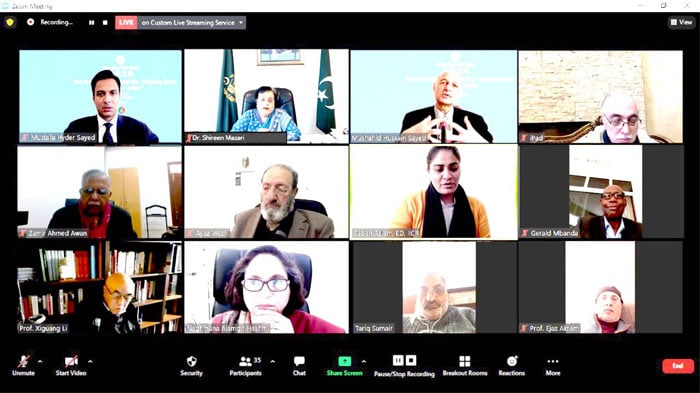Pakistan-China Institute organized a first-of-its-kind webinar on the “New Cold War? Playing the Xinjiang card against China” under its flagship event series, “Friends of Silk Road (FOSR)”.
The Webinar was attended by over 35 participants online, and featured six speeches, including Dr. EjazAkram, Chairman of the Rehmatul Lil Alameen Authority, Dr. ShireenMazari, Federal Minister for Human Rights, Professor Li Xiguang, Director of the Center for Pakistan Cultural and Communication at Tsinghua University, AllamaTahirAshrafi, Special Assistant to the Prime Minister on Religious Affairs, Sabah Aslam, Founder and Executive Director of the Islamabad Institute of Conflict Resolution, and Senator MushahidHussainSayed, Chairman of the Senate Defence Committee and the Pakistan-China Institute.
The dialogue was moderated by Mustafa HyderSayed, Executive Director of the Pakistan-China Institute. Mr. Mustafa HyderSayed highlighted that the US has weaponized human rights and is engaged in the selective application of human rights principles. He emphasized that Pakistan should continue to support China on Xinjiang since China has always supported Pakistan on its core interests.
The panelists discussed how the ‘Xinjiang card’ is used by the Western world, particularly the United States, to achieve their foreign policy objectives of pressuring China. The speakers stressed that laws such as the ‘Uyghur forced labor bill’, and other legislation and policies concerning Hong Kong, Taiwan, and Tibet, are part of a larger ‘China containment’ policy.
Dr. EjazAkram stated that issue of Xinjiang is a flashpoint, which is used by Western groups to rally certain parts of the Muslim world against China. He mentioned that the CIA has a history of blackmailing countries into submission via color revolutions, similar to what they did in countries like Syria, Libya. He emphasized that Pakistan is in a twilight zone between US and China. He advised the Government to support China in its quest for truth, in its quest of protecting its interests and in protecting the region.
A brief video was played which discussed how the US took a politically-motivated decision to remove the East Turkestan Islamic Movement (ETIM), which is recognized as a terror outfit by the United Nations, from its’ list of terror groups. It discussed the double-standards on the part of the US to demonize China, despite being at war in the Muslim world for a couple of decades.
Dr. ShireenMazari, the Federal Minister for Human Rights, stated that the United States is involved in starting a New Cold War with China, in the midst of the COVID-19 pandemic, which requires greater international cooperation. She asserted that the United States has created laws, such as the Uyghur Forced Labor Prevention Act, to sanction China using the ‘Xinjiang card’. She questioned why the United States failed to take action against the genocide of innocent Kashmiris by the Indian occupation forces. She asked why the US failed to speak out against the elimination of Palestinians from their homeland by the Israeli regime. She emphasized that the US is losing power internationally due to its imperialist approach. It also created the military alliance, AUKUS, centered on countering China in the Asia-Pacific region. Efforts to combat China in South Asia include massive military hardware influx and military cooperation.
Professor Li Xinguang discussed that the West fears the unity between the Confucian and Islamic Civilisations. He highlighted that the West’s purpose to play the ‘Xinjiang card’ is to divide and undermine China and create misunderstandings between China and neighboring Muslim countries, as well as those along the Belt and Road. The West wants to turn Xinjiang into another Afghanistan. He stressed that, unlike the United States, who despite failing in the battlefield does not want to see unity among Afghans, China respects the culture and religion of the Afghan people.
AllamaTahirAshrafi, Special Assistant to the Prime Minister on Religious Affairs stated that bills or statements made by the United States regarding lack of religious freedom in Pakistan, China, and Saudi Arabia are baseless. He suggested that these statements are politically motivated, rather than fact based. He stressed that the United States should avoid interfering in the internal affairs of other countries and avoid needlessly criticising China on Xinjiang.
Ms. Saba Aslam discussed that in international politics, the Western world, which has a colonial mindset, uses narratives and sanctions to demonize others. She stressed that the US always imposes unilateral sanctions, which is seen as more effective tool. She predicted that the China and US won’t engage in military conflict since they will fight on an economic level.
Senator MushahidHussainSayed stated that political and economic power in the world is shifting from the West to the East. He agreed with Professor Jeffery Sachs who believes that the US has not been able to compete with China economically. He cited a study by Professor Graham Allison of Harvard University that China has displaced the US as the world’s biggest hitech manufacturer. He linked this with a recent report that China registered a growth of 8 percent in 2021, despite the COVID-19 pandemic.
The speeches were followed by comments from two participants. Ambassador Masood Khalid commented that the West aims to release domino effect in those regions of China, such as Xinjiang, which it perceives as vulnerable. He noted that if Xinjiang is destabilized it will threaten CPEC and the BRI.









